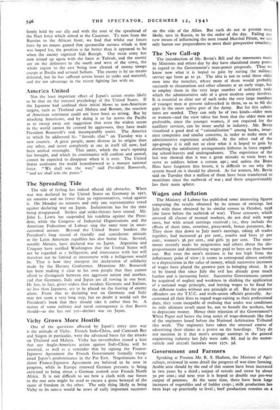The New Call-up
The introduction of Mr. Bevin's Bill and the statements made by Ministers and others day by day have elucidated many points in regard to the Government's man-power proposals. Thus we know now what it is hoped to gain by raising the military service age from 45 to 51. The idea is not to send these older men into the trenches, where most of them would probably succumb to rheumatism and other ailments at an early stage, but to employ them in the very large number of sedentary tasks which the administrative side of a great modern army involves. It is essential to clear out of such tasks the very large numbers of younger men at present sidetracked in them, so as to fill the gaps in the more active part of the Army. But for this substi- tutes are needed. They can only be of two kinds—older men or women—and the view taken has been that the older men are preferable, since the younger women, if not required for the auxiliary services, can be more useful in industry. Mr. Bevin visualised a good deal of " rationalisation " among banks, insur- ance companies and similar concerns, in order to make men of administrative experience available. At the other end of the age-groups it is still not so clear what it is hoped to gain by disturbing the satisfactory arrangements hitherto in force regard- ing school-leavers and undergraduates. The experience of the last war showed that it was a great mistake to train boys to serve as soldiers below a certain age ; and unless the Brass Hats have forgotten this lesson, it is difficult to see why the system based on it should be altered. As for women, Mr. Bevin said on Tuesday that a million of them have been transferred to munitions since the outbreak of war ; and there unquestionably lies their main sphere.


























 Previous page
Previous page